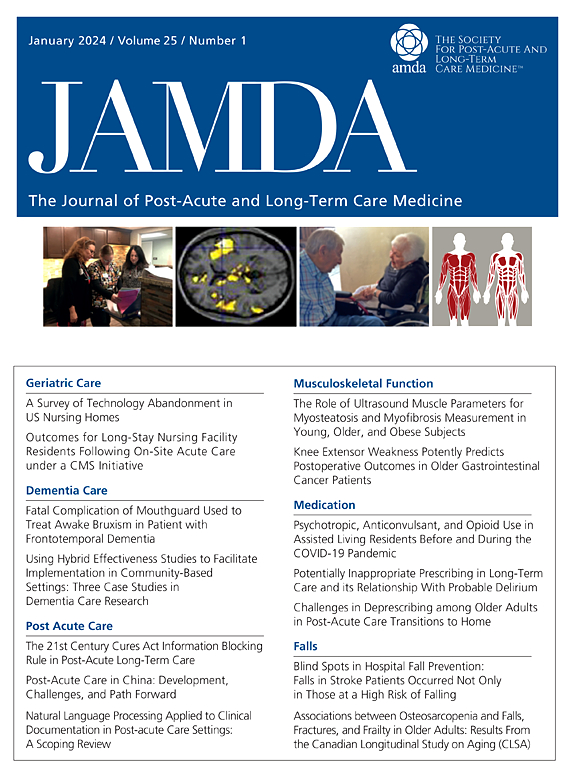Do Medicare Accountable Care Organizations Impact Health Care Utilization among Long-Stay Nursing Home Residents?
IF 4.2
2区 医学
Q2 GERIATRICS & GERONTOLOGY
Journal of the American Medical Directors Association
Pub Date : 2025-03-05
DOI:10.1016/j.jamda.2025.105518
引用次数: 0
Abstract
Objectives
Nursing home (NH) residents are high-cost, high-need Medicare beneficiaries. Accountable Care Organizations (ACOs) have the potential to improve quality of care and reduce potentially unnecessary health care utilization. This study aimed to assess the impact of Medicare Shared Savings Program (MSSP) ACOs on health care utilization among long-stay NH residents.
Design
“Intention-to-treat” and quasi-experimental design.
Setting and Participants
A national cohort of 158,259 fee-for-service Medicare beneficiaries who were long-stay NH residents in 2011 or 2018. In each year, residents were included in the sample the first time their Minimum Data Set (MDS) assessments (ie, index MDS) met the following inclusion criteria: (1) aged 66+; (2) dependence in 2 or more activities of daily living; (3) neither enrolled in hospice nor in coma; and (4) NH length of stay ≥90 days.
Methods
We followed residents’ health care utilization and Medicare expenditures for 1 year after their index MDS date. Outcomes included any health care utilization in different care settings (ie, inpatient, outpatient emergency room visit/observational stay, skilled nursing facility, hospice) and corresponding Medicare expenditures. We used difference-in-differences models to estimate the association between ACO attribution and health care utilization in 2018, using 2011 as the pre-ACO baseline. To determine ACO attribution among the 2011 cohort, we developed an algorithm to replicate the ACO attribution in 2018 and used it to identify residents who would have been attributed to 2018 ACOs back in 2011. To address the endogeneity issue between ACO attribution and utilization outcomes, we used an “intention-to-treat” design to determine ACO attribution.
Results
Adjusted difference-in-differences results showed a lack of significant associations between ACO attribution and health care utilization or Medicare expenditures among long-stay NH residents.
Conclusions and Implications
ACOs did not affect health care utilization of long-stay NH residents. Future payment reforms need to ensure that their benefits could reach these vulnerable older adults.
医疗保险责任医疗机构是否影响长期护理之家居民的医疗保健利用?
目的:养老院(NH)居民是高成本,高需求的医疗保险受益人。问责医疗组织(ACOs)具有提高医疗质量和减少潜在不必要的医疗保健利用的潜力。本研究旨在评估医疗保险共享储蓄计划(MSSP) ACOs对长期居住NH居民医疗保健利用的影响。设计:“意向治疗”和准实验设计。背景和参与者:在2011年或2018年,158,259名长期居住在NH的按服务收费的医疗保险受益人的全国队列。每年,当居民的最小数据集(MDS)评估(即MDS指数)首次符合以下纳入标准时,居民被纳入样本:(1)年龄66岁以上;(二)依赖于两项以上的日常生活活动;(3)既没有接受临终关怀,也没有处于昏迷状态;(4)停留时间≥90天。方法:对居民的医疗保健利用情况和医疗保险支出情况进行随访,随访时间为1年。结果包括在不同护理环境中的任何医疗保健利用情况(即住院、门诊急诊就诊/观察住院、熟练护理设施、临终关怀)和相应的医疗保险支出。我们使用差异中的差异模型来估计2018年ACO归因与医疗保健利用之间的关系,使用2011年作为ACO前基线。为了确定2011年队列中的蚁群归因,我们开发了一种算法来复制2018年的蚁群归因,并使用它来识别2011年被归因于2018年蚁群归因的居民。为了解决蚁群归因与利用结果之间的内生性问题,我们采用了“意向-治疗”设计来确定蚁群归因。结果:经调整的差异中的差异结果显示,长期居住的NH居民的ACO归因与医疗保健利用或医疗保险支出之间缺乏显著关联。结论和意义:ACOs不影响长期住院NH居民的医疗保健利用。未来的支付改革需要确保他们的福利能够惠及这些脆弱的老年人。
本文章由计算机程序翻译,如有差异,请以英文原文为准。
求助全文
约1分钟内获得全文
求助全文
来源期刊
CiteScore
11.10
自引率
6.60%
发文量
472
审稿时长
44 days
期刊介绍:
JAMDA, the official journal of AMDA - The Society for Post-Acute and Long-Term Care Medicine, is a leading peer-reviewed publication that offers practical information and research geared towards healthcare professionals in the post-acute and long-term care fields. It is also a valuable resource for policy-makers, organizational leaders, educators, and advocates.
The journal provides essential information for various healthcare professionals such as medical directors, attending physicians, nurses, consultant pharmacists, geriatric psychiatrists, nurse practitioners, physician assistants, physical and occupational therapists, social workers, and others involved in providing, overseeing, and promoting quality

 求助内容:
求助内容: 应助结果提醒方式:
应助结果提醒方式:


